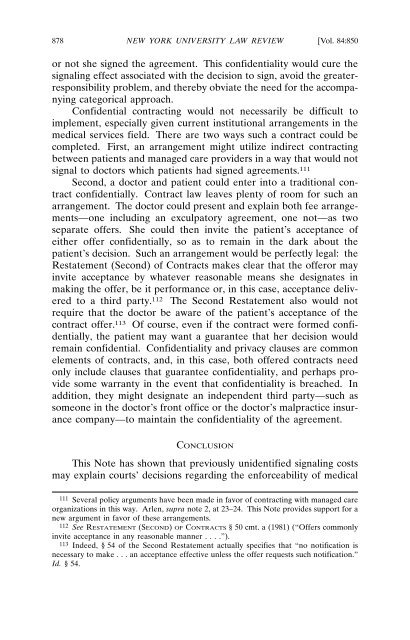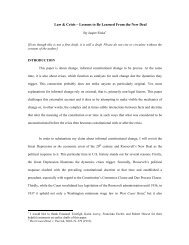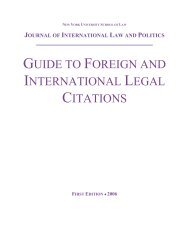In Search of an Enforceable Medical Malpractice Exculpatory
In Search of an Enforceable Medical Malpractice Exculpatory
In Search of an Enforceable Medical Malpractice Exculpatory
Create successful ePaper yourself
Turn your PDF publications into a flip-book with our unique Google optimized e-Paper software.
878 NEW YORK UNIVERSITY LAW REVIEW [Vol. 84:850<br />
or not she signed the agreement. This confidentiality would cure the<br />
signaling effect associated with the decision to sign, avoid the greaterresponsibility<br />
problem, <strong>an</strong>d thereby obviate the need for the accomp<strong>an</strong>ying<br />
categorical approach.<br />
Confidential contracting would not necessarily be difficult to<br />
implement, especially given current institutional arr<strong>an</strong>gements in the<br />
medical services field. There are two ways such a contract could be<br />
completed. First, <strong>an</strong> arr<strong>an</strong>gement might utilize indirect contracting<br />
between patients <strong>an</strong>d m<strong>an</strong>aged care providers in a way that would not<br />
signal to doctors which patients had signed agreements. 111<br />
Second, a doctor <strong>an</strong>d patient could enter into a traditional contract<br />
confidentially. Contract law leaves plenty <strong>of</strong> room for such <strong>an</strong><br />
arr<strong>an</strong>gement. The doctor could present <strong>an</strong>d explain both fee arr<strong>an</strong>gements—one<br />
including <strong>an</strong> exculpatory agreement, one not—as two<br />
separate <strong>of</strong>fers. She could then invite the patient’s accept<strong>an</strong>ce <strong>of</strong><br />
either <strong>of</strong>fer confidentially, so as to remain in the dark about the<br />
patient’s decision. Such <strong>an</strong> arr<strong>an</strong>gement would be perfectly legal: the<br />
Restatement (Second) <strong>of</strong> Contracts makes clear that the <strong>of</strong>feror may<br />
invite accept<strong>an</strong>ce by whatever reasonable me<strong>an</strong>s she designates in<br />
making the <strong>of</strong>fer, be it perform<strong>an</strong>ce or, in this case, accept<strong>an</strong>ce delivered<br />
to a third party. 112 The Second Restatement also would not<br />
require that the doctor be aware <strong>of</strong> the patient’s accept<strong>an</strong>ce <strong>of</strong> the<br />
contract <strong>of</strong>fer. 113 Of course, even if the contract were formed confidentially,<br />
the patient may w<strong>an</strong>t a guar<strong>an</strong>tee that her decision would<br />
remain confidential. Confidentiality <strong>an</strong>d privacy clauses are common<br />
elements <strong>of</strong> contracts, <strong>an</strong>d, in this case, both <strong>of</strong>fered contracts need<br />
only include clauses that guar<strong>an</strong>tee confidentiality, <strong>an</strong>d perhaps provide<br />
some warr<strong>an</strong>ty in the event that confidentiality is breached. <strong>In</strong><br />
addition, they might designate <strong>an</strong> independent third party—such as<br />
someone in the doctor’s front <strong>of</strong>fice or the doctor’s malpractice insur<strong>an</strong>ce<br />
comp<strong>an</strong>y—to maintain the confidentiality <strong>of</strong> the agreement.<br />
CONCLUSION<br />
This Note has shown that previously unidentified signaling costs<br />
may explain courts’ decisions regarding the enforceability <strong>of</strong> medical<br />
111 Several policy arguments have been made in favor <strong>of</strong> contracting with m<strong>an</strong>aged care<br />
org<strong>an</strong>izations in this way. Arlen, supra note 2, at 23–24. This Note provides support for a<br />
new argument in favor <strong>of</strong> these arr<strong>an</strong>gements.<br />
112 See RESTATEMENT (SECOND) OF CONTRACTS § 50 cmt. a (1981) (“Offers commonly<br />
invite accept<strong>an</strong>ce in <strong>an</strong>y reasonable m<strong>an</strong>ner . . . .”).<br />
113 <strong>In</strong>deed, § 54 <strong>of</strong> the Second Restatement actually specifies that “no notification is<br />
necessary to make . . . <strong>an</strong> accept<strong>an</strong>ce effective unless the <strong>of</strong>fer requests such notification.”<br />
Id. § 54.
















